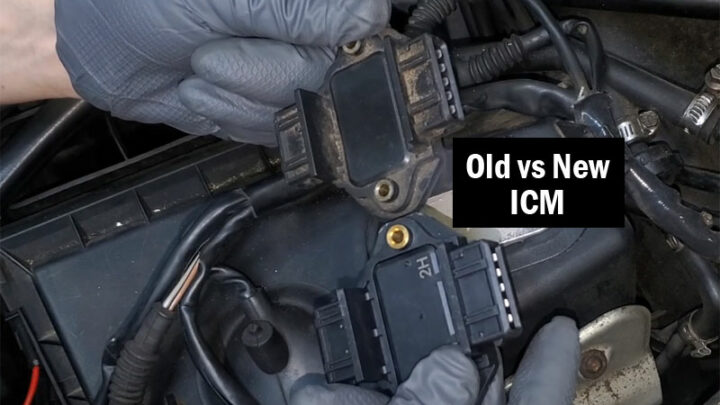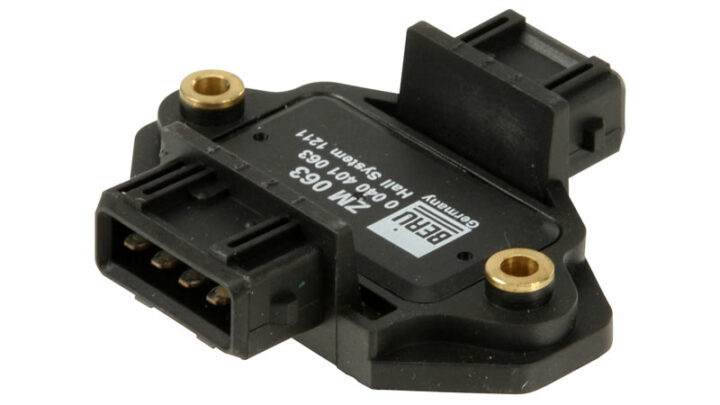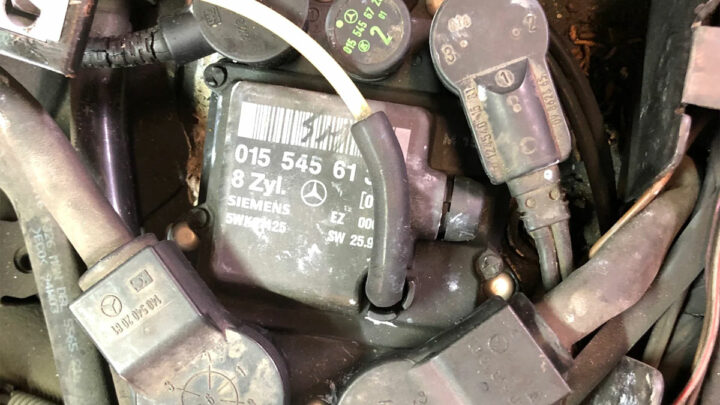4 Symptoms of a Bad Ignition Control Module (and Replacement Cost)
If your car is struggling to start or running rough, the problem may not be battery or fuel system-related. Instead, the ignition control module (ICM) may be to blame.
If you find yourself in this scenario, keep reading. We’ll go over the most common signs of a faulty ignition control module, whether or not you can continue driving, and most importantly, how much it’s going to cost to fix.
What is an Ignition Control Module?
An engine’s ignition control module serves a very important purpose. This device is used to regulate the ignition timing and spark for each respective cylinder of an internal combustion engine. Without this spark, combustion would not otherwise be possible.
In simplified terms, the ignition control module is responsible for cycling an engine’s ignition coils, at the correct time, and at the correct discharge rate.
The ignition control module utilizes input feeds from various sensors, such as the crankshaft position sensor and camshaft position sensor, to determine the correct engine speed, before initiating ignition coil energization.
The computation of this information is critical, as it allows the spark to be distributed to each cylinder at the exact moment in which ideal combustion is possible.
In some applications, the ICM has been largely replaced by a more intricate PCM. Many modern PCMs now possess the ability to compute the same information, in turn, controlling coil actuation in much the same way as earlier ignition control modules.
Therefore, distinct ignition control modules will almost certainly become a thing of the past in the near future.

Bad Ignition Control Module Symptoms
When an engine’s ignition control module starts to fail, it can trigger a variety of secondary issues that range from mild inconveniences to significant concerns. Recognizing these warning signs is important for proper diagnosis before the problem escalates further.
Here are some of the most frequently encountered symptoms that point to a faulty ignition control module:
#1 – Illuminated Check Engine Light
In most cases, the failure of an engine’s ignition control module will lead to the illumination of a vehicle’s check engine light. This typically stems from the logging of random or cylinder-specific misfire faults.
#2 – Rough Idle/Reduced Performance
It’s quite common for a vehicle to experience a rough or erratic idle when its engine’s ICM is on the fritz. Likewise, the failure of an ignition control module also often leads to a noticeable decrease in overall engine output and performance.
#3 – Engine Stalling

In severe cases, a failed ignition control module might also lead to random stalling. This occurs when the module in question completely fails to provide ignition-related spark distribution of any type, thereby completely stifling combustion.
#4 – Starting Issues
Much like in the case of the above-mentioned issue, a vehicle can also experience starting failures, assuming the ICM failure in question is severe enough. Under these circumstances, the affected module completely fails, thereby allowing no spark to pass to each respective cylinder.
What Causes the Module to Fail?
There are several common denominators shared among most cases of ignition module failure. One of the most common causes of ignition module failure is a bad ground connection.
If an ignition control module is inadequately grounded, or if its ground lead is compromised by corrosion or loose fasteners, additional strain is incurred, and module life is negatively impacted.
Additionally, an ignition control module’s lifespan can also be shortened as the result of excessive heat and/or vibration.
Heat and vibration are a module of this type’s natural enemy, due to the fact that most ignition control modules are located within a vehicle’s engine bay. It also bears mentioning that excessive current supply via an overcharging alternator can be yet another cause of ignition control module failure.
Can You Still Drive With a Faulty ICM?
Assuming that a vehicle proves capable of starting and staying running, despite being saddled with a failing ICM, it could, in theory, be driven.
However, doing so is not advised, as the issue at hand can be ever more severe at any second, with little in the way of additional warning. This can lead to a number of pronounced driveability-related concerns of varying magnitude.
In the worst of cases, one can quickly find themselves stranded roadside, should they attempt to push the issue of driving a vehicle equipped with a known fault ignition control module. If an engine’s ignition control module were to fail during your commute, all ignition-related sparks would be lost. As a result, all combustion would cease.
In any event, the root cause of a vehicle’s ignition system-related failures should be thoroughly diagnosed and repaired as soon as possible. Doing so can quite possibly save you from being forced to call for a tow, in the very near future.
If you’re not confident in your ability to handle these repairs on your own, it’s best to schedule a visit with a reputable automotive service center as soon as possible.
Ignition Control Module Replacement Cost
Best places to order parts? See: 19 Best Online Auto Parts Stores

The cost associated with having a vehicle’s ignition control module replaced can vary significantly from one make and model to the next. This is due primarily to fluctuations in parts costs between various vehicle brands. Aside from this, labor costs tend to remain relatively stable from one brand and application to the next.
As a general average, you can expect to pay between $100-$350 to have your vehicle’s ignition control module replaced, with the vast majority of this cost being attributed to parts acquisition. Labor associated with repairs of this nature tends to account for 1/3 of the overall repair cost.
Is Repairing the Module Possible?
In theory, it is possible to repair a vehicle’s ignition control module. However, attempting to do so is probably more of a headache than most would feel compelled to work through.
This is mainly due to the relatively economical price point associated with today’s replacement ICMs. Simply put, attempting such a repair is likely not worth the headache.
Attempting to repair an ICM would involve separating the module’s casing, before inspecting all internal circuitry for burnt spots or signs of arcing. Repair would likely involve removing failed solid-state components within the module’s circuitry, before soldering in suitable replacements.
These are all tasks that require a somewhat specialized skill set to complete. So is repair possible? Yes. Is it a good idea? Probably not.
- 4 Causes of Smoke Coming Out of Your Car Vents - Jun 20, 2024
- 6 Reasons Why Your Car Won’t Start After Getting Gas - Jun 17, 2024
- P2196 Code (Symptoms, Causes, and How to Fix) - Jun 13, 2024

